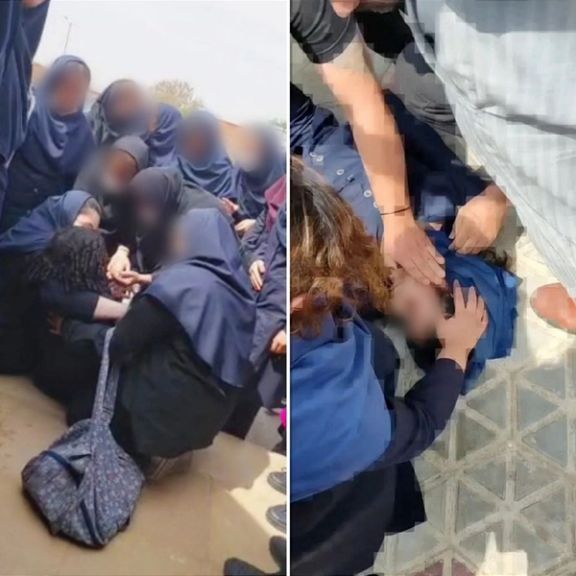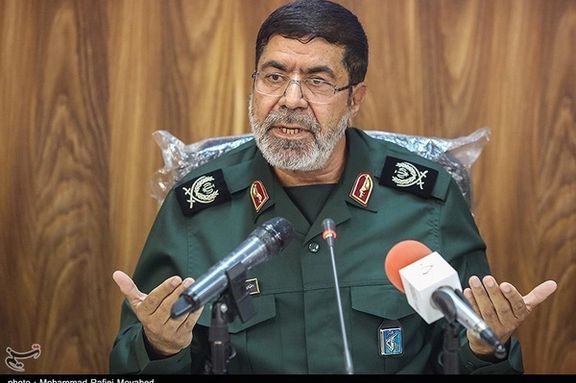Poisoning At Iran Schools Unabated; Regime Urges Media Not To Cover News

Schools in several cities of Iran witnessed suspicious chemical attacks once again on Tuesday, with poisoned students transferred to medical centers.

Schools in several cities of Iran witnessed suspicious chemical attacks once again on Tuesday, with poisoned students transferred to medical centers.
This comes as the Ministry of Islamic Guidance has sent a notice to the local media to censor the news related to the attacks.
Several schools in Tabriz, Esfahan, Shahinshahr, Genaveh, Kermanshah, Oshnaviyeh, and Kamyaran have witnessed suspected poisoning attacks on the students.
Tweet unavailable
Eyewitnesses from the central city of Esfahan say "Two ambulances were sent to Shayan girls school, but none of them had oxygen masks and as a result several students lost consciousness."
Some others from Shahinshahr in Esfahan province also say that a school was subjected to a chemical attack but "they [officials] locked the door and did not allow the poisoned students to leave."
In the city of Kamyaran in western Kordestan province, at least 12 female students of a primary school have been transferred to hospital.
Meanwhile, the Hengaw human rights organization reported that several school principals in Baneh, Kordestan have called on the families not to send their children to school "until full security is provided".
More than four months after the suspected poisonings across hundreds of schools, the country is no closer to finding answers.
According to Deputy Health Minister Saeed Karimi, since the poisonings began on November 30, at least 13,000 female students were taken to medical centers due to suspected gas poisoning.

A regime insider and former editor of the conservative flagship Kayhan Daily, has categorically slammed Iran’s support for Russia in the war against Ukraine.
In a debate at Amirkabir University of Tehran, Mehdi Nasiri severely criticized the foreign policy of the Islamic Republic on Sunday, saying that "we supported Putin's disgraceful aggression against a country and gave him weapons".
Despite evidence provided by Ukraine and Western countries, the Iranian officials for months have denied sending drones to Russia.
Finally, last November Foreign Minister Hossein Amir-Abdollahian confirmed the deployment, admitting they were limited in number, and sent before the outbreak of the war in Ukraine.
Ukraine has accused the officials of the Islamic Republic of Iran of "lying" while the European Union and the United States have imposed several rounds of sanctions against the clerical regime for sending drones to be used in the war on Ukraine.
During his debate with pro-regime insider Mehdi Khanalizedh, Nasiri added that "the Islamic Republic has been looking for nuclear weapons" and therefore " the people and economy of Iran suffered billions of dollars of loss."
"We have established an enemy-oriented system and are mainly looking for the creation of enemies. We must go back and make changes, including in foreign policy,” he said.
He further added that like North Korea, the Islamic Republic wants to be “under the nuclear umbrella of Russia", while "this is the worst way", the Russians not trusted on the global stage.

The Islamic Republic's chief banker says strict measures recently introduced on the banking system are aimed at curbing capital flight, claiming they follow international norms.
Mohammad-Reza Farzin, the governor of the Central Bank of Iran (CBI), said on state TV Monday night that "all the countries of the world have regulations to prevent capital flight, and capital flight means that you give rials and receive a foreign currency, and it doesn't matter if you keep this currency at home or, for example, go to Turkey and buy a house with it.”
Farzin avoided issues of transparency, he claimed people can do whatever they want with their money if it is not illegal or considered laundering. To have control over the people’s money, the Islamic Republic has recently announced regulations that push people to open foreign currency accounts in its notoriously corrupt, if not bankrupt banks in Iran instead of getting the foreign currency in cash.
Farzin said pushing people to have long-term foreign currency accounts is a measure to control the currency market, but the owners of these accounts cannot withdraw deposits in the foreign currency and only can get the equivalent in almost worthless rials. On the other hand, Farzin has said that the CBI does not consider the exchange rate to be at the actual rate at which people are buying and selling currencies in the market, and that the government plans to have a cap on the rates. For example, the rate that Farzin had announced for the exchange of dollars is about half of the exchange rate at the market at about 280,000 rials for one dollar, while the current rate is about 510,000 rials.
The cash-strapped regime has been unable to access a large portion of its export revenues due to international sanctions, and has been eying measures to grab money kept by the public in safety deposit boxes or at homes. In April 2022, the country’s Headquarters for Combating Smuggling of Goods and Currency announced that the maximum limit for keeping foreign currencies is $10,000 or its equivalent in other currencies. For any amount more than this limit, people should apply for special permits.

Elsewhere in his remarks, Farzin referred to a suspicious bank heist last year, the biggest in recent history and the shadiest in nature as robbers broke only into safety deposit boxes and were arrested in a matter of days. Farzin said that according to the information obtained from the robbery as well as the data from other safety deposit boxes throughout the country, about $15-16 billion dollars are kept in boxes.
In June 2022, thieves broke into at least 200 to 250 safety deposit boxes in the central Tehran branch of Iran’s largest bank – the state-owned Bank Melli (National Bank). Apparently, the robbers gained access from an adjacent building during a two-day holiday. Four days after the heist, police displayed recovered money and gold and announced the arrest of nearly 30 people allegedly involved in the large bank heist in Tehran. The surprisingly quick reaction and arrests by the police raised eyebrows with many seeing it as an ‘inside job’. In February, Iran’s judiciary said 20 people involved in the robbery have been released on bail.
A few hours before Iran’s chief banker went on state television, a large group of the victims of the burglary held a gathering in front of the bank and protested "10 months of patience is enough, return our property".

While the ban on the entry of women into sports stadiums in Iran continues, Malavan soccer club has requested the presence of female fans.
In a letter to the Bandar Anzali Security Council and the Football Federation on Monday, the club said “the infrastructure of the stadium is suitable for the entry of families and women”, requesting that “their female fans enter the stadium in the 26th week of Iran's premier football league on Saturday.”
On some occasions when a limited number of women have been allowed in stadiums, they were placed in separate sections, not mixing with men but the ban has subsequently led to many arrests, beatings, detentions, and assaults against women.
The request comes amid a government push to enforce hijab on women and a permission to allow them into a stadium would anger hardliners.
The plea comes as the vice president of the football federation announced in February that “until further notice, the infrastructure for the presence of women in the stadiums is not available”.
The international governing body of the football association (FIFA) has tried to convince Iran’s government to lift an unwritten ban on women attending stadiums to watch male players for nearly a decade.
Iranian officials have always argued that male football fans swear profanities, so the atmosphere of stadiums is not suitable for women even if they are seated in a different part of the stadium.

An Iranian IRGC Commander has hailed Palestinian terror groups, claiming 10,000 attacks have been perpetrated against Israelis this year.
Brigadier General Ramazan Sharif, the head of the Intifada and Quds Central Headquarters of the Islamic Propaganda Coordination Council, said on Tuesday that the formation of a unified anti-Israeli front from South Lebanon and the Syrian Golan Heights to Gaza and the West Bank has challenged Israel more than ever. Groups backed by Iran have carried out terror across three of Israel's borders in the last week, in addition to violent unrest in Jerusalem.
"The emergence of young Palestinian resistance groups and the implementation of amazing operations in the West Bank shows the determination of the new generation of Palestine to reclaim their motherland," he said.
He claimed the constitutional crisis in Israel has challenged the hope of many Israelis for survival and alleged “two million residents of the occupied territories are emigrating from Israel, but the Zionists seek to hide this”. He failed to substantiate the wild figure which would be the equivalent of roughly 20% of Israel’s Jewish population, claiming the reverse migration is the impossibility of thinking of a bright future, in ironic echoes of the sentiments felt by the people of Iran.
He announced plans by the Islamic Republic for a 2,500 strong naval parade for civilians to commemorate Quds Day, an annual event held on the last Friday of the Islamic holy month of Ramadan to express support for Palestinians and oppose Israel and Zionism, a region-wide trend begun by the Supreme Leader.

A week after the reopening of universities in the Iranian new year, authorities have once again begun arresting student activists refusing to wear hijab.
Security forces and plainclothes agents have been deployed at the entrance of the universities to prevent uncovered women from entering, including at Tehran University of Arts, where reports claim “veiled women covered them with shawls”.
The student organizations of the University of Arts called these measures "cheap, insulting and intolerable" adding that large numbers of female students were denied entry for refusing the mandatory hijab. Many girls at universities across the country have received warning texts as the country announced new surveillance measures to catch hijab rebels this week.
Students of Noshirvani University of Babol reported that the messages read: "It has been observed that your clothing in the university environment is not in accordance with the norm announced by the ministry of science and university."
In Al-Zahra University of Tehran, in addition to preventing the entry of students who refuse to observe the mandatory hijab, officials notified all students of the "dress code regulations" on the university portal.
Rules specifically stated that the hijab "must cover their hair and neck" and "short, tight, torn, and unbuttoned clothes and pants are not allowed".
While numbers of arrests are hard to verify in the secretive republic, more than 20,000 Iranians have been arrested since unrest began in September, according to rights group Human Rights Activists News Agency (HRANA).